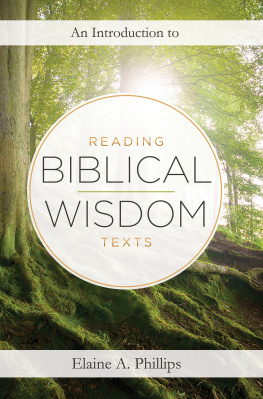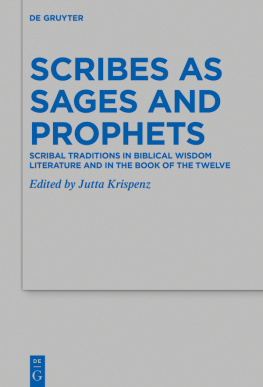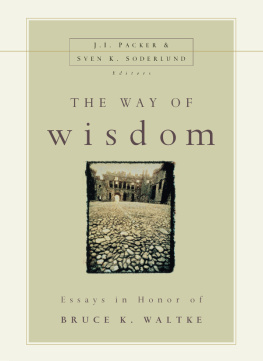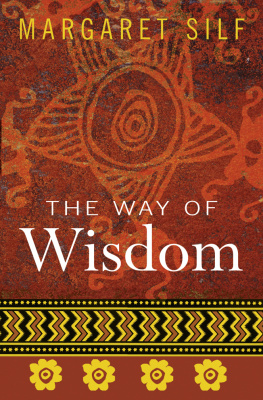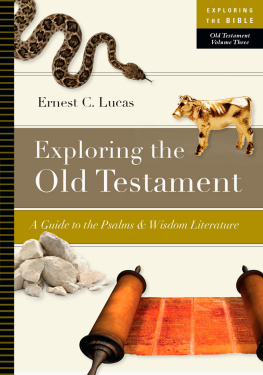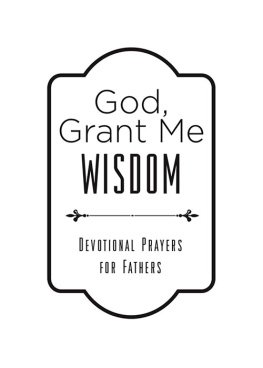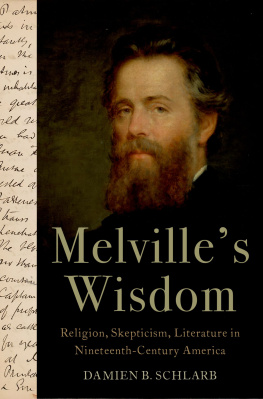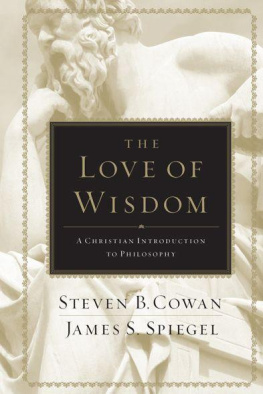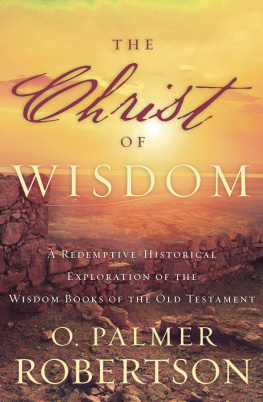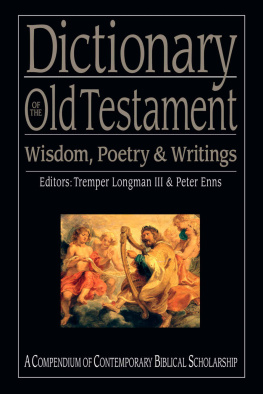An Introduction to Reading Biblical Wisdom Texts (eBook edition)
2018 Hendrickson Publishers Marketing, LLC
P. O. Box 3473
Peabody, Massachusetts 01961-3473
www.hendrickson.com
eBook ISBN 978-1-68307-181-5
All rights reserved. No part of this book may be reproduced or transmitted in any form or by any means, electronic or mechanical, including photocopying, recording, or by any information storage and retrieval system, without permission in writing from the publisher.
Scripture quotations marked (NIV) are taken from the Holy Bible, New International Version, NIV. Copyright 1973, 1978, 1984, 2011 by Biblica, Inc. Used by permission of Zondervan. All rights reserved worldwide. www.zondervan.com. The NIV and New International Version are trademarks registered in the United States Patent and Trademark Office by Biblica, Inc.
Scripture quotations marked (ESV) are taken from the Holy Bible, English Standard Version (ESV), copyright 2001, by Crossway, a publishing ministry of Good News Publishers. Used by permission. All rights reserved.
Due to technical issues, this eBook may not contain all of the images or diagrams in the original print edition of the work. In addition, adapting the print edition to the eBook format may require some other layout and feature changes to be made.
First eBook edition January 2018
Preface and Acknowledgments
In my conversations with students, family members, and random seat partners on airline flights, there are certain questions that inevitably rise to the surface given enough time and candor. Full disclosure: I studiously avoid talking with people seated next to me when I travel, but sometimes it does happen in spite of my best efforts to immerse myself in a book or a nap. When those exchanges do begin, up front I confess that I teach Bible, and the conversation usually grinds to an immediate halt. Occasionally, however, that declaration prompts a curious question. Why on earth... ? And away we go.
At any rate, you can guess some of the subsequent questions in each of these contexts, I am sure. How is it that people do such horrible things to each other? In the face of overwhelming despair, what is the point of living, to say nothing of living well? For that matter, who defines what living well is? Why is your interpretation of right and wrong (righteousness and wickedness) any better than anyone elses? Ah, that one could get uncomfortable, and it suggests such quaint language. Righteousness? Wickedness? What do these words mean? Here is a slightly safer one: Why are some days so boring and others shot full of fearsome perils? But then come questions that are intended to poke holes in my worldview. What kind of a God holds people responsible if he exercises absolute control over their lives? Why must we endure pain? How are we supposed to come to grips with the prospect of dying? Couldnt there have been a better design?
Biblical wisdom texts wrestle with these questions and a host of others. Some of them explore good and orderly living and warn against landing in traps. Others poke a little fun at idiosyncratic human behavior. (Reading some parts of the Bible requires a good sense of humor.) While Song of Songs rhapsodizes about love, still other wisdom texts echo the heart-wrenching outbursts of agony that are only fully understood by those who suffer. No matter the focus, we find in these texts mirrors of our human longing to grasp something of these perplexing aspects of life. We would dearly love to curb unruly circumstances, subdue pain, and stave off the ominous darkness of death. We vainly think that using our good sense will advance these causes.
The Plan
Enough of the opening volley. Heres what I would like to accomplish in this book. Part One will explore an array of introductory issues, the first of which will be looking at basic definitions. We need to zero in on wisdom and folly as we see them through a biblical lens. To be sure, the pursuit of wisdom is universal; our opening questions indicate that. Nevertheless, there is also a powerful moral component of biblical wisdom that will shape the direction of our study rather significantly. It can be distilled in the fear of the LORD, the powerful connection with Torah (Gods instruction) and character traits of humility and trust. Remember those potentially nagging terms righteousness and wickedness?
A second preliminary matter has to do with the nature of Hebrew poetry. It is not an overstatement to claim that poetry is a perfect vehicle to convey rich, sometimes ambiguous, and challenging truths. Part One closes with a brief investigation of the possible historical and theological contexts for the Bibles wisdom texts. Can we legitimately place some or all of them in Solomons tenth-century court circles, or should that suggestion be sent to the dustbin of less sophisticated interpretation?
Part Two will address the practical wisdom found in Proverbs, starting with a brief overview of the pertinent academic questions. These are fascinating, by the way. Please dont skip that chapter! Because no facet of human experience is exempt from the sages keen observations, Proverbs is an endless treasure trove, very difficult to distill and summarize but always yielding more gems with each reading. The chapters that explore these practical nuggets focus on recurring themes: the ever-present challenge to choose between righteousness and wickedness; the power of words; character and human nature; family relationships; discipline and diligence; justice and stewardship.
Part Three focuses on Ecclesiastes. This is one of my favorites. Scholars differ as to whether the views expressed in the book are a comfortable fit with orthodoxy. Was the author just chronically gloomy? The word that defines the book, Hebrew hevel, eludes easy definition. Fittingly, this word may mean elusive, even though popular translations have opted for something like meaningless or vanity. Equally compelling are transient or absurd or enigmatic. Get the picture? This is good stuff. Ecclesiastes alternately presents the reader with disturbing and oddly reassuring realities, rocking back and forth between the perspective from under the sun and the reality of Gods gifts. The author speaks to the frustrating and tedious nature of much of life, the anguish over the brevity of life and the finality of death, and the pain of incessant injustice. And he clings to hope in judgmentof all things. A final chapter in this section addresses several of the more challenging interpretive conundrums in Ecclesiastes 7.
Part Four is devoted to Job. What can I say? Where ought we begin? Awe, humility, trepidation, caution, hopethe character and the book drive us to our knees. As before, our first chapter is given over to the formidable array of academic issues. And then we get into it. Successive chapters address the initial confrontations between God and the adversary, Jobs character and initial lament, and the friends penchant for invoking fear as they attempted to correct Jobs perception of his own situation. All of these are disturbing at their very core. Probing more deeply, we look in turn at how Job felt as he was on the cusp of life and death and at the shocking things he said about and to God. Whether Job spoke chapter 28 or it is an ethereal interlude, it merits its own chapter in this treatment. And what do we do with Jobs final, powerful self-vindication? Do his words in chapters 2931 subvert his entire case? Is he self-righteous and unlikable in the end? Elihus speeches certainly add something to this astonishing work, but the question is

